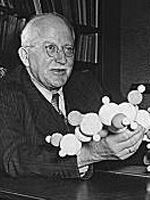Hermann Staudinger
1953 Nobel Prize in Chemistry

Hermann Staudinger (*1881 – †1965) received the Nobel Prize for his great contribution to the understanding of polymers.
Hermann Staudinger, born in Worms in 1881, studied chemistry in Halle, Darmstadt, and Munich and earned his PhD from the University of Halle in 1903. After completing his habilitation in Strasbourg in 1907, he served for a few years as associate professor in organic chemistry at the Technical University of Karlsruhe before accepting a chair in chemistry at the Swiss Federal Institute of Technology in Zurich (1912–1926).
In 1926 he received a professorship at the University of Freiburg, where he remained for the rest of his career. He was director of the Chemical Laboratory until 1951 and head of the State Research Institute for Macromolecular Chemistry until 1956. The latter institution, which Staudinger himself had founded in 1940, was the first research center in Europe to be devoted exclusively to the study of macromolecules in nature and technology as well as the new research field of polymer science.
Hermann Staudinger is the father of macromolecular chemistry. As early as 1920, he discovered that natural fibers, rubber, and plastics are composed of high-molecular compounds (macromolecules, polymers). His concepts concerning the polymeric structures of fibers, plastics, and elastomers were revolutionary and instrumental in bringing about a change in the development of polymeric materials: away from purely empirical optimization towards molecular material design. His work in Freiburg on synthetic and biological macromolecules formed the basis for countless modern innovations in materials research and the life sciences and paved the way for rapid growth in the industrial production of plastics.
Staudinger received the Nobel Prize in Chemistry in 1953 for his groundbreaking work on macromolecules. On 19 April 1999 the American Chemical Society paid tribute to his laboratory in Freiburg as the birthplace of polymer sciences and named it an international historic landmark of chemistry.